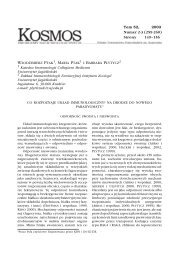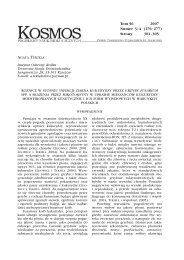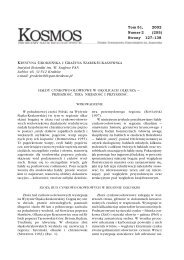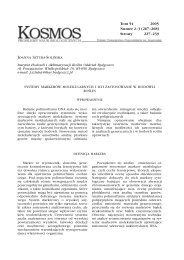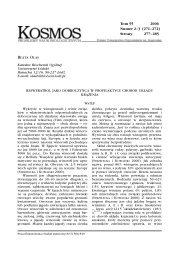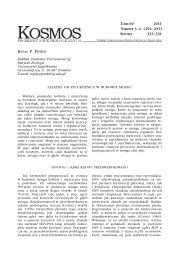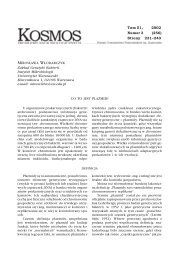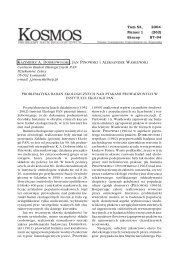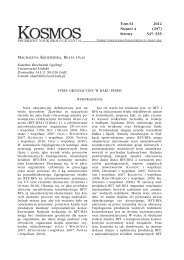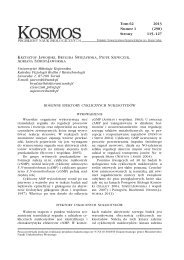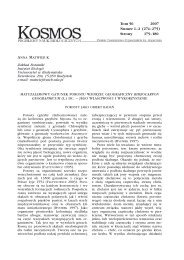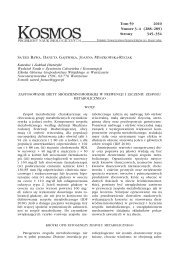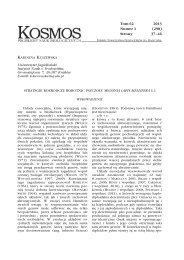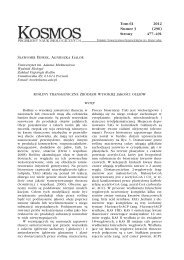Iwona KołodzIejczyK
Iwona KołodzIejczyK
Iwona KołodzIejczyK
You also want an ePaper? Increase the reach of your titles
YUMPU automatically turns print PDFs into web optimized ePapers that Google loves.
368<br />
Physical activity is one of the factors influencing<br />
the process of aging. It has been demonstrated that<br />
high level of cardiovascular fitness and regular engagement<br />
in physical activity may reduce the risk of<br />
developing age-related cognitive decline and dementia.<br />
High level of physical activity has been shown to<br />
correlate with the speed of information processing<br />
as measured by reaction time, however, the results<br />
concerning the association between activity and other<br />
measures of cognitive abilities are inconsistent.<br />
In several studies long-lasting fitness training was<br />
applied to evaluate its influence on brain and cognition.<br />
Participation in training program resulted in<br />
the improvement of both cognitive functioning and<br />
<strong>Iwona</strong> <strong>KołodzIejczyK</strong><br />
THE INFLUENCE OF PHYSICAL ACTIVITY ON THE COgNITIVE FUNCTIONINg IN OLD AgE<br />
albert m. s., jones K., savage c. r., berKman l., seeman<br />
t., blazer d. i współaut., 1995. Predictors<br />
of cognitive change in older persons: MacArthur<br />
studies of successful aging. Psychol. Aging 10,<br />
578–589.<br />
barnes d. e., yaffe K., satarIano w. a., tager I. b.,<br />
2003. A longitudinal study of cardiorespiratory<br />
fitness and cognitive function in healthy older<br />
adults. J. Am. geriatr. Soc. 51, 459–465.<br />
benloucIf s., orbeta l., ortIz r., janssen I., fInKel<br />
s. I., bleIberg j., zee P. c., 2004. Morning or evening<br />
activity improves neuropsychological performance<br />
and subjective sleep quality in older<br />
adults. Sleep 27, 1542–1551.<br />
blumenthal j. a., madden d. j., 1988. effects of aerobic<br />
exercise training, age, and physical fitness<br />
on memory-search performance. Psychol. Aging<br />
3, 280–285.<br />
blumenthal j. a., emery c. f., madden d. j.,<br />
schnIebolK s., walsh-rIddle m., george l. K.,<br />
mcKee d. c., hIggInbotham m. b., cobb f. r.,<br />
coleman r. e., 1991. Long-term effects of exercise<br />
on psychological functioning in older men<br />
and women. J. gerontol. 46, P352–P361.<br />
chrIstensen h., macKInnon a., 1993. The association<br />
between mental, social and physical activity<br />
and cognitive performance in young and old<br />
subjects. Age Ageing 22, 175–182.<br />
churchIll j. d., galvez r., colcombe s., swaIn r. a.,<br />
Kramer a. f., greenough w. t., 2002. exercise,<br />
experience and the aging brain. Neurobiol. Aging.<br />
23, 941–955.<br />
colcombe s., Kramer a. f., 2003. Fitness effects on<br />
the cognitive function of older adults: a metaanalytic<br />
study. Psychol. Sci. 14, 125–130.<br />
colcombe s. j., erIcKson K. I., raz n., webb a. g.,<br />
cohen n. j., mcauley e., Kramer a. f., 2003. Aerobic<br />
fitness reduces brain tissue loss in aging<br />
humans. J. gerontol. A Biol. Sci. Med. Sci. 58,<br />
176–180.<br />
colcombe s. j., Kramer a. f., erIcKson K. I ., scalf<br />
P., mcauley e., cohen n. j., webb a., jerome g.<br />
j., marquez d. x., elavsKy s., 2004. Cardiovascular<br />
fitness, cortical plasticity, and aging. Proc.<br />
Natl. Acad. Sci. USA 101, 3316–3321.<br />
colcombe s. j., erIcKson K. I., scalf P. e., KIm j. s.,<br />
PraKash r., mcauley e., elavsKy s., marquez<br />
d. x., hu l., Kramer a. f., 2006. Aerobic exercise<br />
training increases brain volume in aging<br />
Summary<br />
LITERATURA<br />
well-being. Moreover, several advantageous changes<br />
have been observed in brain structure and function<br />
as a result of aerobic fitness training. The exact neural<br />
basis of these changes has not been discovered<br />
yet, but on the basis of animal research it may be<br />
assumed that neurogenesis, increasing brain vasculature<br />
and neurotransmitters level changes play an important<br />
role in these processes. To sum up, it seems<br />
that regular and whole-life lasting engagement in<br />
physical activity, especially activity that increases<br />
cardiovascular fitness, may constitute an important<br />
factor delaying or even preventing age-related cognitive<br />
decline.<br />
humans. J. gerontol. A Biol. Sci. Med. Sci. 61,<br />
1166–1170.<br />
dIK m., deeg d. j., vIsser m., jonKer c., 2003. early<br />
life physical activity and cognition at old age. J.<br />
Clin. Exp. Neuropsychol. 25, 643–653.<br />
durKa P. j., 1999. Elektroencefalogram i adaptywne<br />
aproksymacje sygnałów. http://brain.fuw.<br />
edu.pl/~durka/EEg_postepy/node1.html stan z<br />
05.07.2007<br />
dustman r. e., ruhlIng r. o., russell e. m., shearer<br />
d. e., boneKat h. w., shIgeoKa j. w., wood j. s.,<br />
bradford d. c., 1984. Aerobic exercise training<br />
and improved neuropsychological function of<br />
older individuals. Neurobiol. Aging 5, 35–42.<br />
dustman r. e., emmerson r. y., ruhlIng r. o., shearer<br />
d. e., steInhaus l. a., johnson s. c., bone-<br />
Kat h. w., shIgeoKa j. w., 1990. Age and fitness<br />
effects on eeG, eRPs, visual sensitivity, and cognition.<br />
Neurobiol. Aging 11, 193–200.<br />
emery c. f., huPPert f. a., scheIn r. l., 1995. Relationships<br />
among age, exercise, health, and cognitive<br />
function in a British sample. gerontologist<br />
35, 378–385.<br />
hassmen P., cecI r., bacKman l., 1992. exercise for<br />
older women: a training method and its influences<br />
on physical and cognitive performance.<br />
Eur. J. Appl. Physiol. Occup. Physiol. 64, 460–<br />
466.<br />
hatta a., nIshIhIra y., KIm s. r., Kaneda t., KIda t.,<br />
KamIjo K., sasahara m., haga s., 2005. effects<br />
of habitual moderate exercise on response processing<br />
and cognitive processing in older adults.<br />
Jpn. J. Physiol. 55, 29–36.<br />
hauser j., leszczyńsKa-rodzIewIcz a., sKIbIńsKa m.,<br />
2005. Wspólne podłoże genetyczne schizofrenii i<br />
choroby afektywnej dwubiegunowej? Psychiatria<br />
2, 145–153.<br />
hIllman c. h., beloPolsKy a. v., snooK e. m., Kramer<br />
a. f., mcauley e., 2004. Physical activity and<br />
executive control: implications for increased<br />
cognitive health during older adulthood. Res. Q.<br />
Exerc. Sport 75, 176–185.<br />
<strong>KołodzIejczyK</strong> I., 2007. Neuropsychologia starzenia<br />
poznawczego. Kosmos 56, 49–62.<br />
Kramer a. f., hIllman c. h., 2006. Aging, physical<br />
activity, and neurocognitive function. [W:] Psychobiology<br />
of physical activity. acevedo e. o.,<br />
eKKeKIaKIs P. (red.). Human Kinetics, 45–59.<br />
Kramer a. f., hahn s., cohen n. j., banIch m. t.,<br />
mcauley e., harrIson c. r., chason j., vaKIl e.,



